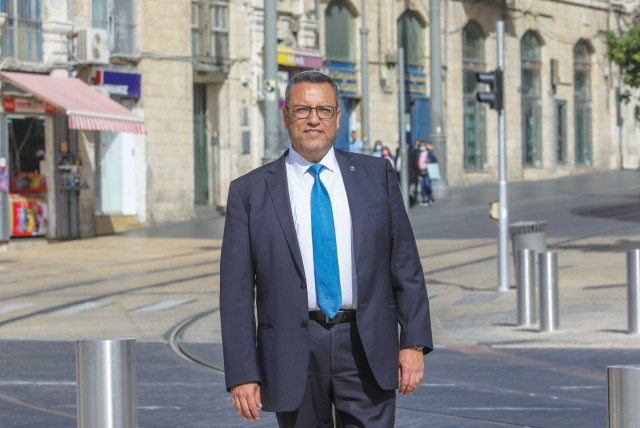This week in Jerusalem: From ashes to Holy City

A weekly round-up of city affairs.
From ashes to the Holy City
While most of the survivors of the October 7 massacre in Kibbutz Be’eri are staying temporarily at Dead Sea hotels, a kibbutz delegation is examining a project that would house all the residents, 1,000 in total, in Jerusalem. If approved, the project will enable them to live together in the capital for the duration of the kibbutz’s rehabilitation, which is expected to take at least three years.
Kibbutz Be’eri lost 85 people in the massacre, and another 26 were kidnapped to Gaza. The kibbutz’s property and infrastructure were severely damaged.
The plan under consideration is to use an almost-finished project in the Kiryat Hayovel neighborhood. Construction has already been completed, but the project has not yet been marketed, and the apartments will be ready in the near future.
The complex includes three high-rises with a total of 350 apartments intended as rentals only; therefore, it should be suitable for the Kibbutz Be’eri evacuees.
A reliable source notes that the city’s highest officials, including Mayor Moshe Lion, are involved in the project and encouraging its implementation. In addition, professionals in the municipality are checking it out. If approved, it will require the city to prepare teachers, kindergartens, educational institutions, and the neighborhood community to meet the needs of the kibbutz members.
Emergency squads
About 100 residents from Pisgat Ze’ev, Ir David, French Hill, Talpiot, Har Homa, and other neighborhoods have completed basic training and started preparing new security measures. The plan, shared by the municipality, the police, and the Home Front, is to reach at least 33 standby squads to protect the city. So far, 550 volunteers in the neighborhoods have joined and completed an intake process that includes training in shooting. More squads are on their way in Nof Zion, Pisgat Ze’ev, Gilo, French Hill, Talpiot/Baka, Ramat Shlomo, and Ramot.
The commander of the Jerusalem District, Superintendent Doron Turgeman, said that these units will be activated in emergency situations. The cooperation of the police and the municipality, with the support of the National Security Ministry, will strengthen the sense of security in the region and help maintain the safety of the residents of Jerusalem.
Baby steps incur residents’ wrath
A municipal decision to close the Ramot C branch of Tipat Halav (child healthcare centers) because the building was declared unsafe is unacceptable to mothers in the neighborhood. Last week, residents and clients of the clinic were informed that the staff will move to the clinic in Ramat Shlomo, which already serves residents of Ramot B and Ramot C. They are demanding to know why they are not allowed to use the clinic in Ramot A.
Many in these neighborhoods rely on public transportation, and with winter approaching, coupled with the war, many feel that no one at Safra Square is responding to their concerns.
Mothers affected by the decision declared that this is a basic service that every local authority should provide to its residents, especially in a city that has so many births, especially Ramot B. For now, the municipality’s solution is to extend the hours of activity at all Tipat Halav branches.
Back to work
More than half of the workers in the Sanitation Department who live in east Jerusalem did not report to work in the first days of the war, apparently due to fear that they would be harassed following the massacre in the South. Many workers from the maintenance and cleaning teams were also absent from the hospitals.
At Shaare Zedek Medical Center, about 15% of the cleaners were absent, and Hadassah-University Medical Center also had a personnel crisis. The hospitals solved the problem, thanks to volunteers, some of them teenagers. However, as the days passed, Arab workers began returning to work.
During the first week of the war, an Arab employee who was cleaning Hillel Street was brutally attacked by a group of radical young Jews, and was lying on the ground wounded. A few days later, two Jewish youths were arrested for attacking a municipal worker who was cleaning Mahaneh Yehuda. Following these events, the city’s chief rabbis issued a clear and unequivocal message that innocent people – in this case, Arab workers – should not be harmed.
Time for a discount
Deputy Mayor Yosi Havilio appealed to Interior Minister Moshe Arbel to increase the property tax discount for reserve officers to 30% and to exempt students living in Jerusalem apartments until the school year starts. The Interior Ministry replied that approval of the request depends on a budget from the Finance Ministry, but it agreed to consider the matter.
At the end of the fourth week of the war against Hamas – and in light of the extensive mobilization of the reserves, as well as the postponement of the start of the academic school year – Havilio and his United Jerusalem faction member Laura Wharton said that their position is based on the amendment to the law from last year. It allowed the municipality to give a 5% discount on property taxes to reserve soldiers and a 25% discount to active reserve commanders.
Buses on Shabbat
Who says there is no public transportation on Shabbat from Jerusalem to major cities and back? For the second week, public transportation has been provided to these locales. The service is expected to continue for the coming weeks, according to a decision by Transportation Minister Miri Regev, who personally approved operating public transportation throughout Shabbat.
Buses operate every Friday and Saturday from the capital to Tel Aviv, Haifa, and Beersheba. The bus lines are open to members of the security forces, as well as to the general public.
Bus lines leaving from the Central Bus Station on Jaffa Road to several cities throughout the country are:
- Line 470 (Jerusalem-Beersheba) leaves Jerusalem on Friday at 4 p.m., 7 p.m., 10 p.m.; on Saturday at 8 a.m., 11 a.m., 2 p.m., and 5 p.m.
- Line 480 (Jerusalem-Tel Aviv) departs on Friday at 6:30 p.m. and 9:30 p.m.; on Saturday at 8 a.m., 11 a.m., 2 p.m., and 5 p.m.
- Line 960 (Jerusalem-Haifa) departs on Friday at 4:30 p.m., 7 p.m., and 10 p.m.; on Saturday at 8 a.m., 11 a.m., 2 p.m., and 4:30 p.m.
Details on bus routes operating on Shabbat are not officially published by the ministry, but they can easily be found on the Transportation Our Way consumer organization’s website, which promotes transportation policy in Israel and publishes the most up-to-the-minute information. ❖
Jerusalem Post Store
`; document.getElementById("linkPremium").innerHTML = cont; var divWithLink = document.getElementById("premium-link"); if (divWithLink !== null && divWithLink !== 'undefined') { divWithLink.style.border = "solid 1px #cb0f3e"; divWithLink.style.textAlign = "center"; divWithLink.style.marginBottom = "15px"; divWithLink.style.marginTop = "15px"; divWithLink.style.width = "100%"; divWithLink.style.backgroundColor = "#122952"; divWithLink.style.color = "#ffffff"; divWithLink.style.lineHeight = "1.5"; } } (function (v, i) { });

